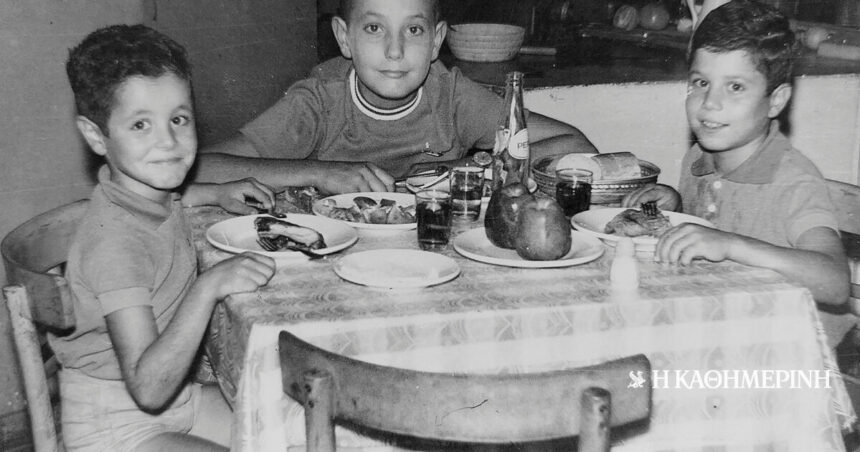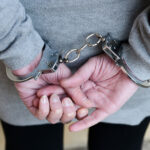On the morning of September 22, 1974, the passenger ship “Patras” was tied to the port of Piraeus. Had started from Limassol by carrying hundreds of unaccompanied children of Greek Cypriot refugeeswho abandoned the ancestral outbreaks because of the double Turkish invasion. The mission was organized under an agreement by the Ministry of Education of Cyprus with the Holy Metropolis of Ilia, until the access of the displaced to the basic goods is restored: Housing, Security and Education.
Most children would be hosted by families in Pyrgos – some would remain in the church boarding houses. It was a journey of survival. Traumatic, but also redemptive at the same time. Fifty -one years later, the unaccompanies of Cyprus tell their unprecedented experience.
Escape
On the deck of “Patras”, among others, the twelve -year -old found George Nikolaou with his sister Panayiotas From Beauty – a suburb of Nicosia, half occupied today. But also the Michael Michaelnine years old, also with one year older brother, Peter. Their home was in Gerolakkos, where on August 15 ELDYK fell into one of the most heroic battles in the history of the Greek army.
We asked Michael Michael if he remembers what he felt just before boarding the ship and left his family behind. “I was terrified by what preceded, the coup and the Turkish invasion. From the twelve -hour bombing of our village, our fierce escape. Separation was difficult. We had realized fear and concern. But we had to leave, “he tells us.
As our second parents – “These people loved us as their children and we loved them as second parents. And indeed, they never made a distinction between their own child with us, “explains Michael Michael of his own” uncles “, the family who welcomed him to Greece.
George Nikolaou remembers them dozens of refugees Hosted by his grandfather, mayor of Beauty. Their faces were engraved by anxiety and fear. It was then too young to realize that there would be a similar route. “My father asked us if we wanted to go to Greece. “Everyone?” I wondered.
“No, only you and Panayiotas,” he responded. I immediately answered “yes” and I was happy to have the opportunity to travel by boat. My sister said “I don’t want to go”. But it was definitive. When we arrived in Limassol, Joy began to mix with fear and insecurities. On the ladder of the boat I realized that not only will I be alone, but also I will have the responsibility of my sister, “Mr Nikolaou confides.
“The children of the 1974 War were flooded with repeated stressful events: invasion, violent uproar, panic, war clashes, injuries, persecutions, displacement,” K tells K. Andrea EmmanuelPsychologist, specialized in children and adolescents and PhD candidates at the University of Athens. But what was a parent to send his child away, even if the host country was Greece’s “sister”?
“Survival preceded any other need. These children experienced separation from their parents as a violent – unintentional removal, which took place in panic conditions, where decisions had to be made at dizzying speed. A trip without a return ticket. Unthinkable scenes of injuries to children’s psyche, “replies Mrs Emmanuel.
The difficult look back
 Under the threat of a third invasion, counting over 4,000 dead and 2,000 missing, the government of the Republic of Cyprus had to handle 170,000 refugees – a society on the borders of disintegration. Dozens of public buildings – including schools – had been occupied for housing, while thousands were still staying in tents. As the weeks went by, more and more families were looking for a way to leave their children for Greece.
Under the threat of a third invasion, counting over 4,000 dead and 2,000 missing, the government of the Republic of Cyprus had to handle 170,000 refugees – a society on the borders of disintegration. Dozens of public buildings – including schools – had been occupied for housing, while thousands were still staying in tents. As the weeks went by, more and more families were looking for a way to leave their children for Greece.
OR Niovi Kerkidou He arrived in Piraeus with the second mission in early October. She was eight years old and in her ears the noise of the Turkish bombers Above her home in Morphou. From the first moment he was in the boarding school he wanted to return to Cyprus. Describes in “K” her experience as’ painful ‘:’ These experiences influenced my emotional world at the age of eight and led me to one  Psychic state, “he says.
Psychic state, “he says.
For many years Mrs Kerkidou did not want to remember. For some time, when she was the same mother, she decided to capture what she lived, but also to collect testimonies of dozens of other children in 1974, contributing to the public history of the Cyprus problem. The title of her book is “Thanks”. It was a process of purification.
“When I started writing it was now transparent what I was offered. I had recognized and appreciated the love, kindness and dilatation of those who surrounded me in the Orphanage of Agia Filothei. “Thanks” is addressed to the people in Greece For their love, solidarity and their contribution to the suffering Cypriot people. ” “The past, as well as the care of the trauma, requires to see it, to touch it, to clean it even if it hurts. Only in this way can the treatment process begin, “says Emmanuel.
Niovi Kerkidou was one of the children who were not hosted at home. Nor did George Nikolaou wanted to leave the boarding school, and the process of choosing unaccompanied by the families of the tower reminded him of a peculiar “child -moving”. “I felt it because I saw people unknown come into the room and take children and get lost. I had promised my sister to watch her and I wanted to be with her. On the first day I didn’t accept to go to a family. “
When he realized that the girls would be transferred to another place anyway, he was persuaded to leave. He did it with pain and crying. Today he describes the “uncles” as he calls them, and their children, his family. “From these people I got too much. I consider them my parents and my brothers. “
“These people proved that what they did then they really felt it. They loved us as their children and we loved them as second parents. And indeed, they never made a distinction between their own child with us, “Mr Michael adds of his own” uncles “. Both feel tenderness and gratitude today.
The loss
One morning in December 1974 George Nikolaou did not go to school. The “uncles” informed him that his father was in Greece and would all go together to meet him in Peloponnese, Ilia. There he learned the young man who would have marked his life since then: Panagiotis was dead. He died, at the age of 11, from pathological causes at the boarding school. On the same day, her funeral and burial were held in a female monastery in the area.
Endless tragedy – George Nikolaou was separated from his sister at the boarding school in Ilia. He ended up in a family. A few days later she was informed of her death. “For many years I felt guilty because I couldn’t protect it as I promised her.”
“For many years I felt a lot of guilt because I couldn’t protect her as I promised her. I had a weight on my conscience. When I returned to Cyprus we did not discuss it for at least 15 years. We didn’t even mention that year in Greece, ”recalls Mr Nikolaou.
“As brothers’ relationships are one of the longest, death also means the loss of part of the surviving brother’s identity. Some losses are impossible to be understood, “Emmanuel estimates, adding:” One mourners are often observed. “Unwritten law” of silencewhich forbids members from talking openly about the loss. They consciously choose to silence, avoiding contact with painful feelings and thoughts. “
The silence broke when George Nikolaou repatriated his sister’s bones. “When I learned that the relics were exhumed I talked to my mother. He told me to do what I feel. Eventually I was able to bring the bones and buried them with our father. A year later my mother died, so now they all rest together in the same grave. I now feel that I have fulfilled at least some of my promise. ” Mr Nikolaou has been traveling to Greece for 43 years. “And that’s why I felt guilty and shame. My sister found her phone number Katerinaof his daughter Georgiou who had me at home. I went and saw them. Despite the years that passed, I would recognize them in thousands of other people. “
Return to a foreign place
The unaccompanied of Cyprus returned to the island in the winter of 1975. However, they never saw their homes, which were now under Turkish occupation. The connection to their place was lost forever. “They cut our lives at four. We had our lives and our friends in Gerolakkos, all of a sudden we lost it all. We started from the beginning in the village where we found ourselves as refugees, it was cut. We started again in Greece, it was interrupted too. After the beginning again in the New Village, when we came back. The concept of refugee is everywhere the same. A feather in the wind without roots, no identity and a point of reference, “says Michael.
“Returning to a well -known but ultimately unknown place has contributed to the extension of the traumatic experience, as yet another forced adjustment came to be cumulatively added to the difficulties that had passed. The creation of terrain of wound healing was impossible, “says Emmanouil, coming from a family of refugees in Kyrenia.




